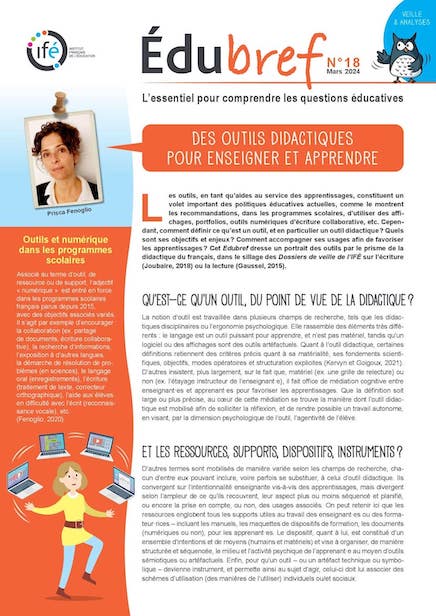| à propos de la revue | sommaires des autres numéros |
British Journal of Educational Technology (BJET)
Référence : Vol. 48, n°2, mars 2017
- Unobtrusive monitoring of learners’ interactions with educational games for measuring their working memory capacity, Mohamed Ali Khenissi, Fathi Essalmi, Mohamed Jemni, Kinshuk, Ting-Wen Chang and Nian-Shing Chen
- Is immersion of any value? Whether, and to what extent, game immersion experience during serious gaming affects science learning, Meng-Tzu Cheng, Yu-Wen Lin, Hsiao-Ching She and Po-Chih Kuo
- Educational games as stand-alone learning tools and their motivational effect on L2 vocabulary acquisition and perceived learning gains, José Ramón Calvo-Ferrer
- Towards a trans-disciplinary methodology for a game-based intervention development process, Sylvester Arnab and Samantha Clarke
- Quality parameterization of educational resources from the perspective of a teacher, Štefan Karolčík, Elena Čipková, Milan Veselský, Helena Hrubišková and Mária Matulčíková
- Examining a one-hour synchronous chat in a microblogging-based professional development community, Fei Gao and Lan Li
- Assessing the attention levels of students by using a novel attention aware system based on brainwave signals, Chih-Ming Chen, Jung-Ying Wang and Chih-Ming Yu
- The complementary use of audience response systems and online tests to implement repeat testing: A case study, Rebecca Stratling
- Recommending peers for learning: Matching on dissimilarity in interpretations to provoke breakdown, Kamakshi Rajagopal, Jan M. van Bruggen and Peter B. Sloep
- Collaborative learning across physical and virtual worlds: Factors supporting and constraining learners in a blended reality environment, Matt Bower, Mark J. W. Lee and Barney Dalgarno
- VILLAGE—Virtual Immersive Language Learning and Gaming Environment: Immersion and presence, Yi Fei Wang, Stephen Petrina and Francis Feng
- Virtual worlds to support patient group communication? A questionnaire study investigating potential for virtual world focus group use by respiratory patients, Michael J. Taylor, Dave Taylor, Ivo Vlaev and Sarah Elkin
- Developing a validated instrument to measure preservice teachers’ ICT competencies: Meeting the demands of the 21st century, Jo Tondeur, Koen Aesaert, Bram Pynoo, Johan van Braak, Norbert Fraeyman and Ola Erstad
- Who or what contributes to student satisfaction in different blended learning modalities?, Anh-Nguyet Diep, Chang Zhu, Katrien Struyven and Yves Blieck
- Emerging pedagogies for the use of iPads in schools, Ruth Geer, Bruce White, Yvonne Zeegers, Wing Au and Alan Barnes, How educators build knowledge and expand their practice: The case of open education resources, Allison Littlejohn and Nina Hood
- ClassPrep: A peer review system for class preparation, Jooyong Park
- Introducing electronic textbooks as daily-use technology in schools: A top-down adoption process, Thomas K. F. Chiu
- Teaching presence in computer conferencing learning environments: Effects on interaction, cognition and learning uptake, Huahui Zhao and Kirk P.H. Sullivan
- Investigating variables predicting Turkish pre-service teachers’ integration of ICT into teaching practices, Aydın Aslan and Chang Zhu
- Design possibilities for the e-Schoolbag: Addressing the 1:1 challenge within China, Xiaoqing Gu, Xiaojuan Xu, Huawen Wang and Charles Crook
- iPad versus traditional tools in art and design: A complementary association, Nicos Souleles
- iRPD—A framework for guiding design-based research for iPad apps, Natalia Kucirkova
- A pilot study of the use of emerging computer technologies to improve the effectiveness of reading and writing therapies in children with Down syndrome, Vanessa G. Felix, Luis J. Mena, Rodolfo Ostos and Gladys E. Maestre
- Learning English using children's stories in mobile devices, Nadire Cavus and Dogan Ibrahim
- Differences in the digital home lives of young people in New Zealand, Maggie Hartnett
- Integrating socio-cultural contexts and location-based systems for ubiquitous language learning in museums: A state of the art review of 2009–2014, Hong-You Wang, Gi-Zen Liu and Gwo-Jen Hwang
- How technology shapes assessment design: Findings from a study of university teachers, Sue Bennett, Phillip Dawson, Margaret Bearman, Elizabeth Molloy and David Boud
- Interaction pattern analysis in cMOOCs based on the connectivist interaction and engagement framework, Zhijun Wang, Terry Anderson, Li Chen and Elena Barbera
- Exploring the function of online narratives to develop critical thinking and localisation of knowledge in an international science program, Marianne Hicks, Melissa Tham and Rowan Brookes
Informations complémentaires :
http://onlinelibrary.wiley.com/.../issuetoc?campaign=woletoc
catégorie(s) : contenu de l'éducation














